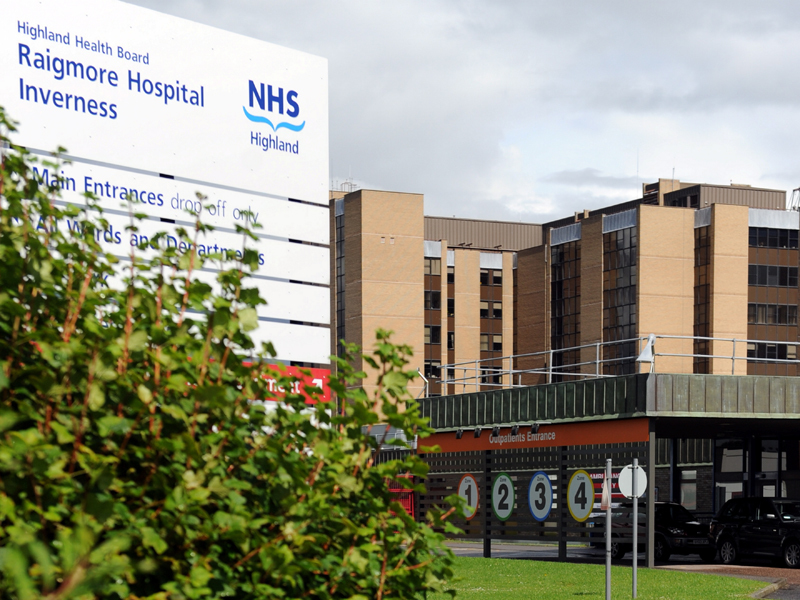Angry and heartbroken mothers have made a catalogue of complaints against NHS Highland – including allegations that mistakes in its maternity care contributed to the deaths of some babies.
One woman claims a missed diagnosis led to the stillbirth of her child – while another said she was treated “like a piece a meat” as staff ignored her cries of pain.
One mother complained about being surrounded by happy new mums as she had to deliver her dead child.
The health board has even faced allegations that women in labour were turned away from hospital.
Last night, NHS Highland said the dossier of complaints – released to the Press and Journal under freedom of information legislation – represented a small fraction of the number of patients who were treated.
But a leading patient group said the allegations were “frightening” and unacceptable in modern healthcare.
The complaints were made against four maternity units across the north – Raigmore at Inverness, Oban’s Lorn and Islands General Hospital, Caithness General Hospital and Belford at Fort William – over the past five years.
Among the 52 allegations, one woman claimed she lost her baby because a doctor failed to carry out basic examinations.
“The patient had a miscarriage which she feels could have been avoided if further blood tests and investigations had been carried out when she first complained of bleeding,” a report said.
Another woman alleged that midwives and medics failed to pick up the early symptoms of pre-eclampsia, which she said led to the still-birth of her son.
The woman had to deliver her dead baby in a unit where she could hear the sounds of other mothers with their new babies.
One man alleged that his partner, who had been bleeding, lost their baby when a nurse failed to return her phone call because she “was in a meeting”.
“After 30 minutes the patient had heard nothing,” the complaint form said.
“The patient went to hospital and it was discovered that staff had missed something in the first scan and the patient subsequently lost her baby.
“Staff maintained that they had tried to contact the patient.”
Another woman in labour was left furious by the attitude of midwives, claiming she was told to shut up and “save your energy for pushing” when she raised concerns that her baby was too big to get out.
“The patient remembers the midwives saying to each other ‘we’re going to have to cut her’. This made the patient feel like a piece of meat,” the complaint form said.
A new mother complained she had to give birth to her daughter in a lay-by after she was turned away from a community hospital.
“The hospital would not allow the patient to stay as there were no facilities for a newborn baby,” the complaint report stated.
“During the journey to Inverness the ambulance had to pull into a lay-by where the patient gave birth.
“The patient’s placenta did not deliver and the patient required surgery.”
Mary Scanlon MSP, Highlands and Islands, said she was given assurances that care would improve after raising a number of “very serious concerns” about the treatment of mothers and newborn babies in the past.
“Having now heard of these 52 complaints, I think this is now a matter for the health minister to respond to,” she added.
Dr Jean Turner, executive director of Scotland Patients Association, said: “There are lots of concerns, and this not just with NHS Highland, about staffing levels and facilities which are raised in relation to stillborn births.
“It is a shame that these people obviously have felt that the only way to get their answers is to make a complaint. I hope they got the answers in the end.”
A Scottish Government spokeswoman said: “We understand how distressing it is when a parent loses a child and this is a matter for NHS Highland to consider.
“Getting maternity care right for every woman is the cornerstone of family health and we expect all boards to ensure the care they provide is of the highest quality and responsive to women’s needs.”
NHS Highland medical director Dr Ian Bashford stressed the number of complaints was small in comparison to the number of births that took place in the region every year.
However, he admitted that staff did not always get everything right.
“There are around 3,000 births a year in NHS Highland’s maternity units. While the number of complaints is comparatively small, we do take every individual complaint extremely seriously,” he said.
“Each one is fully investigated, and if we identify any failings on our part then we will take immediate action to rectify them.
“Unfortunately, we do not always get everything right but we are committed to learning and improving.
“We do take some comfort from the fact that according to a recent survey, patients accessing one of our maternity services – at Raigmore Hospital, Inverness, where over 1,900 women give birth every year – labelled the care they received as excellent.
“All responses received showed that a high level of care was given at Raigmore, with many of the results over the national average.
“However, we recognise there is never room for complacency, and will continue to endeavour to improve all our services, including those provided across all our maternity units.
“We will also continue to encourage feedback, and would urge anyone who feels they have not had the appropriate level of care to let us know as quickly as possible.”
Margaret Watt, chairwoman of Scotland Patients’ Association, said no one should be forced to complain about medical professionals who are paid to look after each person in their care properly.
“These complaints are horrific to look at, frightening and incredibly serious,” she said.
“It is very sad in 2014 that we are hearing about incidents of this nature, whether they were upheld or not.”
